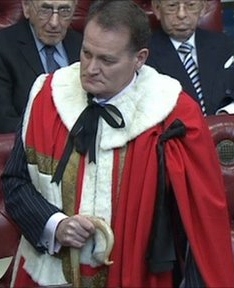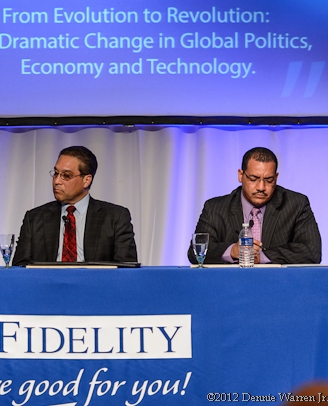Archive for January 29th, 2013

TCI lodges formal request for Misick’s extradition
 (CNS): Officials from the Turks and Caicos Islands have made the formal request to the Brazilian government for the return of the country’s former leader, the TCI government said Tuesday. Michael Misick has been held in a high security jail cell in Brazil since he was arrestedon an international warrant in connection with a major corruption investigation in the TCI. Although Misick has sent word from the prison on several occasions that he is willing to return to face the special prosecution team in TCI, the government has continued to press ahead with a formal process.
(CNS): Officials from the Turks and Caicos Islands have made the formal request to the Brazilian government for the return of the country’s former leader, the TCI government said Tuesday. Michael Misick has been held in a high security jail cell in Brazil since he was arrestedon an international warrant in connection with a major corruption investigation in the TCI. Although Misick has sent word from the prison on several occasions that he is willing to return to face the special prosecution team in TCI, the government has continued to press ahead with a formal process.
"The formal request for Michael Misick's extradition to the Turks and Caicos Islands (TCI) was lodged with the Brazilian government today,” a statement from the governor’s office in the overseas territory said Tuesday.
“The Turks and Caicos Islands’ Chief Magistrate and the acting Attorney General formally certified the papers last week and they were taken to Brazil on Sunday. Some time was needed to assemble the documentation and to have the request translated into Portuguese, however the request has been made well within the time limit imposed by the Extradition treaty, in accordance with the intention of the TCI Government and the Special Investigation Prosecution Team (SIPT) to secure Michael Misick's return to the TCI by due process of law," the officials added.
Misick has sent word via his family as well as in written notes from his cell that his human rights are being abused and that he was arrested unlawfully. He claims he has done nothing wrong and has not been charged with any crimes and despite offering to return immediately to TCI he has been held in the Brazilian high security prison.
With the extradition now underway and there being no contest from Misick, the former TCI premier is likely to return home in a matter of weeks, where the political party he once led is now back in office. He will then be questioned by the special prosecutors regarding his role in the high profile corruption scandal there that saw direct British rule imposed on the territory for more than two years.

Woman freed in arson case
 (CNS): A fifty-year-old woman who had admitted throwing a propane gas canister through the window of a property, which then exploded, was found not guilty of arson by a jury on Tuesday. Lita Chollette Davis was accused of deliberately and recklessly damaging the apartment where she lived with her boyfriend in Fig Close in West Bay in October 2011. However, she denied that she intended to cause the destruction, claiming that she did not expect the tank, which she threw in a fit of temper, would explode. Edward Henry was inside the property when it did, however, explode in the early hours of the morning, destroying the apartment, damaging a police car and causing Henry serious injury.
(CNS): A fifty-year-old woman who had admitted throwing a propane gas canister through the window of a property, which then exploded, was found not guilty of arson by a jury on Tuesday. Lita Chollette Davis was accused of deliberately and recklessly damaging the apartment where she lived with her boyfriend in Fig Close in West Bay in October 2011. However, she denied that she intended to cause the destruction, claiming that she did not expect the tank, which she threw in a fit of temper, would explode. Edward Henry was inside the property when it did, however, explode in the early hours of the morning, destroying the apartment, damaging a police car and causing Henry serious injury.
Henry was hospitalized for more than two weeks and treated for serious flash burns, which he had received in the explosion when he was thrown from his apartment into the yard. The police car was damaged as RCIPS officers had arrived on the scene almost at the same time that the property exploded, having received a report of the altercation from Henry sometime earlier.
The defendant did not give evidence during the trial but she told the police after her arrest that she had made two attempts to throw the gas tank inside the house. She had stated that this was in an effort to get her boyfriend to come outside and talk with her after he had locked her out of the home they shared following an argument they were having that evening, during which she had received a bloody nose and a black eye.
The jury heard that both the defendant and the victim had a tumultuous relationship and had been drinking that night before they began to argue. The chief justice, who was presiding over the trial, had directed the jury that the case hung on the defendant’s state of mind at the time but that self-induced intoxication was not a defence. Although she had admitted being responsible for the gas ending up inside the property, the question the jurors had to decide was whether she deliberately meant to cause the damage and whether or not she was aware of the dangers associated with throwing a gas tank into a house.
Davis told police in an interview shortly after the explosion that she had no idea that when she hauled the propane gas tank from the regulator outside the property into the home it would blow up. She said her intentionwas to have Henry come outside. She did not mean to cause anyone harm or to cause any damage and had never imagined that the tank of highly flammable liquid which the couple used for cooking would explode. Davis said that she believed by throwing the tank into the apartment then Henry would come outside.
Chief Justice Anthony Smellie took some two hours to sum up the details of the case and direct the jury on the law and the questions they had to decide on, before sending them to deliberate on their verdict. The six women and one man returned after just over two hours with their not guilty verdict.
Davis, who is a foreign national and had received the assistance of an interpreter throughout the case, wept quietly when the verdict was delivered before the chief justice discharged her.

UK lord may be moved aside for local boss
 (CNS): Although the current Cabinet appears to be relatively pleased with the lobbying work being undertaken by Lord Blencathra, the UK Conservative peer maybe facing a change in his role. Sources indicate that the interim government wants to see a Caymanian back at the helm of the London Office. While the Tory lord may still be able to assist the Cayman government when it comes to the financial sector, it is understood that the ambassadorial role traditionally held by the head of the Cayman office in the UK should be held by a native of the islands. Blencathra is paid some CI$19,000 per month to represent Cayman but his title as director of the office may soon be removed.
(CNS): Although the current Cabinet appears to be relatively pleased with the lobbying work being undertaken by Lord Blencathra, the UK Conservative peer maybe facing a change in his role. Sources indicate that the interim government wants to see a Caymanian back at the helm of the London Office. While the Tory lord may still be able to assist the Cayman government when it comes to the financial sector, it is understood that the ambassadorial role traditionally held by the head of the Cayman office in the UK should be held by a native of the islands. Blencathra is paid some CI$19,000 per month to represent Cayman but his title as director of the office may soon be removed.
It is not clear yet whether Charles Parchment, the most senior Caymanian in London, will take up the top job or whether another Caymanian will be sent to London but it is becoming increasingly clear that the government wishes for Blencathra to confine his work to the lobbying on behalf of the financial services sector.
The appointment of the Tory peer by former premier McKeeva Bush stirred up controversy both here and in London when even the UK's Foreign Office questioned whether it was appropriate to have a government member of the UK’s House of Lords as an ambassador for an overseas territory. Bush claimed on a number of occasions that Cayman Islands Governor Duncan Taylor had also tried to block the appointment.
Although the peer was cleared by the UK’s own parliamentary committees of any potential conflict of interest, his status as a non-Caymanian continues to generate controversy back in Cayman.
Speaking at a government press briefing last week, both Premier Juliana O'Connor-Connolly and Deputy Premier Rolston Anglin indicated that, while Belncathra’s lobbying was still welcome, the government was reconsidering the structure of the London Office and pointed for the need to make savings there.
Related article:
Lord Blencathra threatens legal action (CNS 30 November 2012)

Leaders find common ground
 (CNS): Without former premier McKeeva Bush on the political panel at the CBO conference Thursday, few sparks flew as both the opposition leader and the deputy premier appeared to find common ground on a number of issues. Rolston Anglin,who has been education minister since the 2009 General Election, has rarely missed an opportunity to take political potshots at the former education minister, Alden McLaughlin, over the cost of the two high schools. But in a particularly cordial debate, the two politicians seemed to be in harmony on education and many of the major issues of the day. From the need to reduce the size of government and the services it delivered to encouraging Caymanians into tourism, the policy position of both men was notably similar.
(CNS): Without former premier McKeeva Bush on the political panel at the CBO conference Thursday, few sparks flew as both the opposition leader and the deputy premier appeared to find common ground on a number of issues. Rolston Anglin,who has been education minister since the 2009 General Election, has rarely missed an opportunity to take political potshots at the former education minister, Alden McLaughlin, over the cost of the two high schools. But in a particularly cordial debate, the two politicians seemed to be in harmony on education and many of the major issues of the day. From the need to reduce the size of government and the services it delivered to encouraging Caymanians into tourism, the policy position of both men was notably similar.
In the absence of the former premier, who was listed in the programme to join his former opposite number and former Cabinet colleague, back-bench MLA Ellio Solomon, who is expected to be appointed as deputy leader of the UDP at the forthcoming party conference, stood in for Bush and attempted to generate some disagreement on the panel. Nevertheless, the debate was an amicable affair with very little controversy. Anglin and McLaughlin both began to look like party colleagues rather than government and opposition.
There were no representatives from the independent camp, despite the community clamour in recent times for more independents in parliament. It is not clear if either of the two MLAs already in the LA were invited but an invitation was extended by CBO to the Coalition for Cayman (C4C). However, none of its candidates or supporters accepted the offer.
The three men who did make the political debate faced questions about their vision for Cayman in 2020, taxation, gambling, minimum wage and one man, one vote.
Both McLaughlin and Anglin talked about the need to reduce the high levels of taxes and fees that present a serious economic burden to both the business community and the man in the street through a reduction in the size of government and the services it delivers. The two leaders said they would not introduce a direct tax of any kind if elected to office and hoped to reduce the existing fees and taxes in an effort to attract more business. Solomon also stated that the UDP did not support any direct taxation, despite his party leader’s attempts to introduce an expat payroll tax last year.
There were few revelations from the politicians about how they would address the economic conundrum that will face any new government, which is how to balance the budget with a growing demand for more services but an increasingly precarious revenue base. Both Anglin and McLaughlin spoke about the need for government to move some services into the private sector so that they could roll back taxes.
McLaughlin said there was a need to restore confidence in government and to eradicate corruption and poor governance, which has impacted business in Cayman. He called for reliable economic figures and a leaner, more efficient government. He said a world class education system was needed to address the problem of unemployment among Caymanians as the system, despite all the work in recent years, had still not recovered from previous years of neglect.
He called for the completion of the John Grey High School and the implementation of the education law to undermine the changes that have been made. McLaughlin also offered his support for the Shetty Health City and medical tourism as a third leg to the local economy. He said he wanted to see a level playing field for local and foreign workers and pointed to the need for a minimum wage to deal with that.
Meanwhile, Anglin, who has been less supportive in the past of a minimum wage, suggesting that it does not address the poverty question, offered his support for a level of pay below which no one should be expected to work. He said it was important for Caymanians to be involved in the economy and he agreed that required a world class education, which he said he hoped would be achieved soon when he rolled out the rest of the reforms following on from past work. He also said he wanted to see government regulate and legislate but it needed to get out of the way of business.
Echoing comments made by McLaughlin, he said he wanted to see Caymanians embracing employment opportunities in tourism. He said that for too long there had been a cultural phenomenon that discourages local people from that sector and there was a desperate need to bring down government debt.
Solomon said Cayman needed to become more self-sufficient when it came to food and that he wanted to see a slow and measured approach to reducing the size of government. He also pointed out that, although both McLaughlin and Anglin had been labour ministers in the past, neither had introduced a minimum wage, something that Solomon himself did not appear to support, although he calledfor a review or committee.
McLaughlin said that although the ministry had already undertaken reviews, research and consultation (as called for by Solomon) when he was minister for labour, the strong opposition in the business community meant he ran out of time. Anglin pointed to the lack of full support across the UDP and implied that Solomon himself was one of those blocking the move.
When it came to the issue of one man, one vote, only McLaughlin remained fully committed, with Solomon wanting a national slate and Anglin still wavering over single member constituencies but he accepted that the country would likely move to one man, one vote.

Gender gaps and income
In the Cayman Islands, between 1989 and 1999 females’ mean income almost doubled, compared with a 74.6% increase for males. However, the absolute value of this increase was still less than that for males and the gender income gap actually grew during that period. It was not until the new millennium that the increase in females’ mean income narrowed this gap, from 24% in 1999 to 16.6% in 2010.
Data from the 2010 Census of Population and Housing reveal that females also earned less money than their male counterparts at every level of education and within many occupations and industries. The widest gap was found in elementary occupations, where a female earned an average of 64¢ for every $1.00 that a male earned. University-educated women earned $17,431 less than university-educated men per year, which added up to a difference of over 23%.
While this gap has closed over time, the continuing difference in the average income of males and females reflects lingering inequalities in our society and it is important to address the root causes of inequality in order to create a better and more equal future. When males and females have the same opportunities to earn income there are positive effects for women, for children and families, for the economy, and for society as a whole.
Direct and indirect discrimination
Direct discrimination in income can occur when men and women receive different pay for the same work or when they have different job requirements for the same pay. These discrepancies may be based on sex or on gender characteristics, which are qualities that define what we think of as “femininity” and “masculinity”. For example, an employer may assume that a woman wouldn’t be able to take on a difficult new task because females are not as good at complex problem-solving, or may believe that only a man should be promoted to a management position because males are inherently better leaders.
Indirect discrimination in income is even more complicated and can result from a number of different factors that people often don’t consider. For example, women tend to work fewer hours than men and takecareer breaks because of the unequal burden of unpaid domestic work and caring for children and the elderly. Additionally, jobs traditionally associated with men tend to pay better than traditionally female jobs for the same level of skill required and irrespective of the level of qualification.
Stereotypes and prejudices
Women’s work is undervalued in part because they are seen as having primary responsibility for unpaid work in the home and caregiving. This channels females into similar occupations and industries, such as domestic work, education and human services. The skills required in these roles and “feminine talents” like caring and nurturing are not rewarded or well-paid. Once the gender division of labour is established it encourages women to choose these occupations. Employers often further reinforce the division by not adapting work environments to suit men and women or by favouring one sex over the other.
Women also tend to be at a disadvantage in the labour market because some behaviours — like self-promotion and negotiation — that work for men and lead to higher salaries and career progression may actually backfire on women and cause them to be penalised when they are perceived differently.
When we have expectations or feelings about people based their sex or gender we may act in ways that negatively affect them. Often we don’t even think about these stereotypes or prejudices and hurt or disadvantage someone without even realising it. We might think that we are simply behaving in ways that accurately reflect the realities or abilities of men and women, but we are actually discriminating and reinforcing inequality.
Promoting gender equality
Gender gaps in part reflect the outcomes of discriminatory social processes. Therefore, valuing girls and boys and men and women equally and promoting equality of opportunity in all areas is important to minimise discrimination that leads to and reinforces inequality.
As individuals we can all strive to recognise stereotypes or prejudices we may have about the qualities or capabilities of males and females and what roles, career paths and other personal choices are “suitable” for each sex.
When we are more conscious of these assumptions we can choose how we respond – within our families and home lives; in the workplace as employers and employees; as parents, teachers and mentors to children; and in other relationships and positions that we have and hold. We can choose to act in ways that promote equality.
In 2013, make it a New Year’s Resolution to promote gender equality. Don’t stereotype.
Under the Gender Equality Law, 2011, it is illegal for employers to discriminate on the basis of sex, gender, marital status or pregnancy in employment and related matters or to pay unequal remuneration to men and women performing work of equal value. If you believe you have been discriminated against you can make a complaint to the Gender Equality Tribunal. For more information, please contact get@gov.ky or 244-3226 or visit www.genderequality.gov.ky.

Victims all survive major road smash
(CNS): Two drivers and three young passengers all escaped serious injury on Heroes Day during a major collision in Breakers. Police are now looking for witnesses to the two vehicle crash which happened at around 4.20pm Monday. A silver Honda Civic was travelling towards Bodden Town from East End when the driver lost control on a right bend and collided with a Chevrolet Optra travelling in the opposite direction. The driver of the Honda Civic a 32 year old male received injuries to his legs. The driver of the Chevrolet Optra, a 32 year old female and three passengers aged 15,11 and 8 all received minor injuries.
Emergency services attended the accident and although all parties were taken to the Cayman Islands hospital in George Town no one involved in the accident its facing life threatening injuries despite both vehicles receiving extensive damage.
Any witnesses to the accident are asked to contact the Bodden Town Police Station on 949 2220